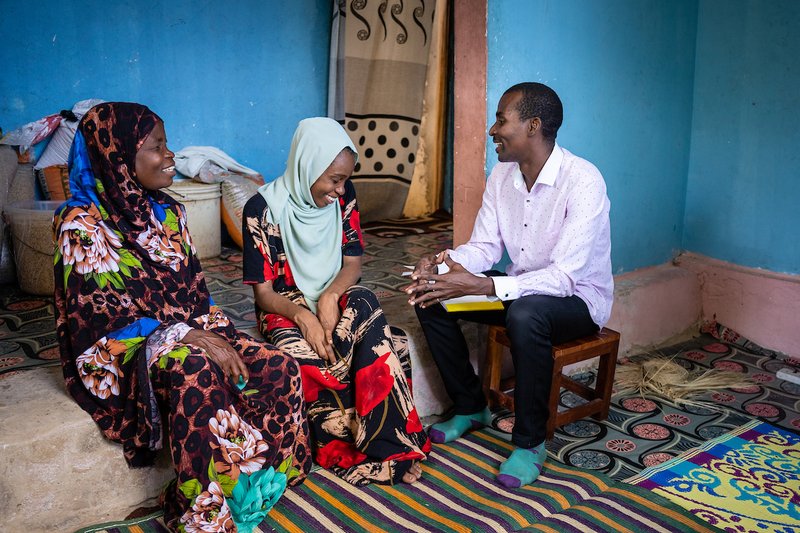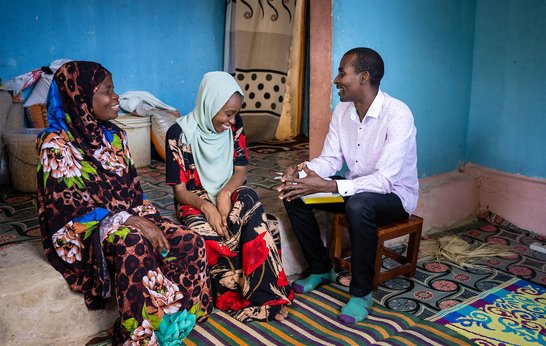
Mr Seif Bakar Shaibu (pictured right) meets with Mzowele Khamisi Juma, a 52-year-old LF patient (pictured left) and her daughter Zuleika Sheha Haji, who serves as her primary caregiver (center)
Marcus Perkins
Elimination of neglected tropical diseases (NTDs) is achievable when partners come together to prioritize and invest in them, and a key player in this effort is the pharmaceutical industry. Through large-scale drug donation programmes, significant financial and other commitments, and investment in R&D, the pharmaceutical industry is helping accelerate progress against NTDs.
In particular, drug donation programmes provided by the pharmaceutical industry provide essential medicines that are critical for both treating and preventing a range of NTDs. National governments use these donated medicines in mass drug administration (MDA) interventions, ensuring that millions of people receive lifechanging treatments to help break the cycle of transmission of NTDs.
These drug donation programmes are helping drive progress towards the World Health Organization’s (WHO) NTD road map goals and the Sustainable Development Goal (SDG) 3 target of reducing by 90% the number of people requiring an intervention against an NTD.
Progress to date
-
Nearly 17 billion treatments
have been donated by pharmaceutical industry companies from 2012 to 2023.
-
More than 1 billion treatments
are donated each year, including during the COVID-19 pandemic from 2020 to 2022.
-
26% decrease
in the number of people needing interventions since 2010.
What is the NTD drug donation programme?
Access to essential NTD medicines has been significantly boosted by unprecedented support from the pharmaceutical sector, which has provided large-scale donations of medicines. Recognizing that the populations most in need of medicines to target NTDs are also those least able to afford them, the pharmaceutical industry established mechanisms to donate medicines and expertise to affected countries. These efforts are delivered through partnerships with WHO, development agencies, non-governmental organisations, and philanthropic donors.
In the last 30 years, pharmaceutical companies have established programmes to donate 17 different medicines, resulting in billions of tablets, capsules, intravenous and oral solutions being distributed. These donations are supported by the necessary manufacturing, supply chains, and research, making NTDs one of the largest drug donation initiatives in history. Pharmaceutical industry and other partners donating medicines to NTDs include AbbVie, Bayer AG, Eiken Chemical Company Ltd, Eisai Co. Ltd, EMS Brazil, Fundacion Mundo Sano, Gilead, Global Access Diagnostics, GSK, Johnson & Johnson, Medicines Development for Global Health, Merck & Co. (MSD), Merck KGaA, Novartis, Pfizer, and Sanofi.
Why are drug donations critical to fighting NTDs?
In combination with cross-cutting measures such as safe drinking water, sanitation, hygiene (WASH), and community engagement, drugs are essential in the fight against certain NTDs. They play a vital role in preventing NTDs by interrupting the transmission of parasites, as well as treating them by alleviating symptoms.
Once donated, these medicines can be distributed through MDA to reach the people who need them most. MDA typically involves:
- School-based distribution, targeting school-age children.
- Community-based distribution, either through door-to-door visits or centralized distribution at locations such as community centers, places of worship, markets, or the homes of community leaders or medicine distributors. A combination of both methods can also be used.
When implemented effectively, drug donation programmes not only improve the quality of life for communities but also contribute to achieving broader health goals, such as reducing poverty.
Industry commitment beyond drug donations
While drug donation programmes are essential, the pharmaceutical industry also contributes to the fight against NTDs in other significant ways. Many companies provide additional financial and in-kind donations, particularly to support the work of the WHO and other partners. The pharmaceutical industry is also helping to accelerate research and development efforts for new diagnostic tools and treatments in collaboration with non-profit and R&D organisations and are helping to drive new implementation strategies. Many pharmaceutical companies have endorsed the Kigali Declaration, further committing to advancing the fight against NTDs and helping to scale up efforts for disease control and elimination. The engagement of the pharmaceutical industry also attracts other donors, amplifying the impact of NTD programmes—every dollar invested leverages an additional $26 worth of donated medicines, boosting return on investment and making NTD programmes one of the best buys in global health.
What still needs to be done?
While drug donations and industry commitments are vital, funding from other donors is needed to ensure that these generously donated drugs reach those who need them. MDA programmes and other methods of implementation require sustained support and financing to achieve the elimination of certain NTDs. Only then can the full impact of the drug donation programmes be realized.
Spotlight on: GSK’s commitments
GSK has been a long-standing partner in the fight against NTDs, working with the global community since 1999 and reaching over 935 million people with their medicines. To date, GSK has donated nearly 12 billion doses of albendazole, a medicine crucial to eliminating lymphatic filariasis and treating soil-transmitted helminths (STH). These donations have had a transformative impact on communities, especially across the African continent, improving health, education, and employment outcomes. GSK are committed to donating medicines until lymphatic filariasis has been eliminated as a public health problem everywhere. They are now exploring options with WHO and other partners on how they can support countries post elimination to ensure drugs can be available to treat any new cases through a hybrid model.
The path forward
Uniting to Combat NTDs will continue to collaborate with our partners to ensure that industry commitments are sustained and expanded. This includes not only maintaining drug donation programmes but also supporting access, local manufacturing, and broader NTD efforts. Drug donation programmes are a critical part of a comprehensive suite of tools and approaches. Together, with a concerted effort across various sectors, we can unite, act, and eliminate NTDs.
